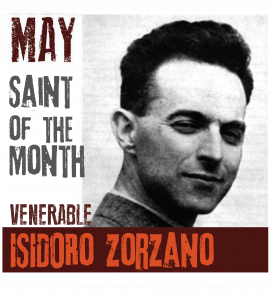 Isidoro Zorzano was born in Buenos Aires, Argentina on September 13, 1902. Three years later his family moved to Spain. His father died when he was young and his mother and three siblings stayed in Spain. During his high school years he became friends with a classmate, Josemaría Escrivá (now St Josemaria Escriva). As a teenager, Isidoro began to live his faith more seriously, and he looked for a priest who could advise him on living a Christian life. Isidoro carried out works of mercy, and always sought to help those around him. A recession hit Spain and his family lost almost all their savings. Isidoro and his younger brother thought about giving up their studies in order to support the family with their work. Nevertheless, their mother and two sisters wanted both of them to continue their studies. Isidoro began to give private classes to bring in some income. After obtaining a degree in industrial engineering, he worked in a shipyard. Later he moved and worked for a Railway Company. There he also gave classes in the local Industrial School. During this period he began to feel a growing spiritual restlessness. In 1930, Josemaría Escrivá (who had been ordained a priest five years earlier) helped Isidoro deepened his life of prayer. Isidoro would attend daily Mass and receive Communion, and collaborated in works of assistance to the needy. He was known for his sense of justice, his spirit of service. During the Spanish Civil War he assisted many people, providing them with provisions, food, and spiritual support. He had a great love for the Eucharist. Despite all the restrictions, he brought Fr. Josemaría and some other priests the bread and wine they needed to celebrate Mass secretly. He also kept the sacred hosts in his room so that those in hiding could receive Communion, and informed those he knew of the possibility of attending the Eucharistic celebration in certain apartments. To help all these people, he relied upon his status as a foreigner, using his birth certificate from Buenos Aires. But this provided little protection against being arrested and executed at any time. After the war, Isidoro worked at the Western National Railway Company and for Opus Dei. Early in 1943 he was diagnosed with cancer. He accepted this painful illness with fortitude and abandonment to God’s will. He died with a reputation for sanctity a few months later when he was only 40. In 2006 he was declared a Servant of God and in 2016 Venerable by Pope Francis.
Isidoro Zorzano was born in Buenos Aires, Argentina on September 13, 1902. Three years later his family moved to Spain. His father died when he was young and his mother and three siblings stayed in Spain. During his high school years he became friends with a classmate, Josemaría Escrivá (now St Josemaria Escriva). As a teenager, Isidoro began to live his faith more seriously, and he looked for a priest who could advise him on living a Christian life. Isidoro carried out works of mercy, and always sought to help those around him. A recession hit Spain and his family lost almost all their savings. Isidoro and his younger brother thought about giving up their studies in order to support the family with their work. Nevertheless, their mother and two sisters wanted both of them to continue their studies. Isidoro began to give private classes to bring in some income. After obtaining a degree in industrial engineering, he worked in a shipyard. Later he moved and worked for a Railway Company. There he also gave classes in the local Industrial School. During this period he began to feel a growing spiritual restlessness. In 1930, Josemaría Escrivá (who had been ordained a priest five years earlier) helped Isidoro deepened his life of prayer. Isidoro would attend daily Mass and receive Communion, and collaborated in works of assistance to the needy. He was known for his sense of justice, his spirit of service. During the Spanish Civil War he assisted many people, providing them with provisions, food, and spiritual support. He had a great love for the Eucharist. Despite all the restrictions, he brought Fr. Josemaría and some other priests the bread and wine they needed to celebrate Mass secretly. He also kept the sacred hosts in his room so that those in hiding could receive Communion, and informed those he knew of the possibility of attending the Eucharistic celebration in certain apartments. To help all these people, he relied upon his status as a foreigner, using his birth certificate from Buenos Aires. But this provided little protection against being arrested and executed at any time. After the war, Isidoro worked at the Western National Railway Company and for Opus Dei. Early in 1943 he was diagnosed with cancer. He accepted this painful illness with fortitude and abandonment to God’s will. He died with a reputation for sanctity a few months later when he was only 40. In 2006 he was declared a Servant of God and in 2016 Venerable by Pope Francis.

